How can we remove CO2from the atmosphere and make an active contribution to climate protection? How can we reduce our material consumption, recycle more and at the same time develop alternative raw materials? At Festo, we have been dealing with these questions for quite some time and are breaking new ground: we are transferring our expertise in automation technology to biological processes.
The cell as a factory
Living cells are the smallest factories in the world. Algae cells turn sunlight, carbon dioxide and water into oxygen and chemical energy carriers or valuable organic materials using photosynthesis in their chloroplasts. Algae are tiny climate saviours because they bind ten times more CO2than land plants. Through automated cultivation in bioreactors, this value can be increased by a factor of ten.
Optimised growing conditions thanks to automation
Our automation technology provides a closed circuit for the efficient cultivation of biomass on a large scale while saving resources at the same time. The biomass can be used in the chemical, food or pharmaceutical industries. We are presenting the BionicCellFactory as a tool for biological transformation towards an environmentally sound circular economy.
The BionicCellFactory is divided into five modules in which nature and technology are merged in different ways. Unlike in chemical processes, we do not need to use high temperatures, high pressures and toxins.
The five modules of the cell factory
1. CO2 collection: binding CO2 from the air
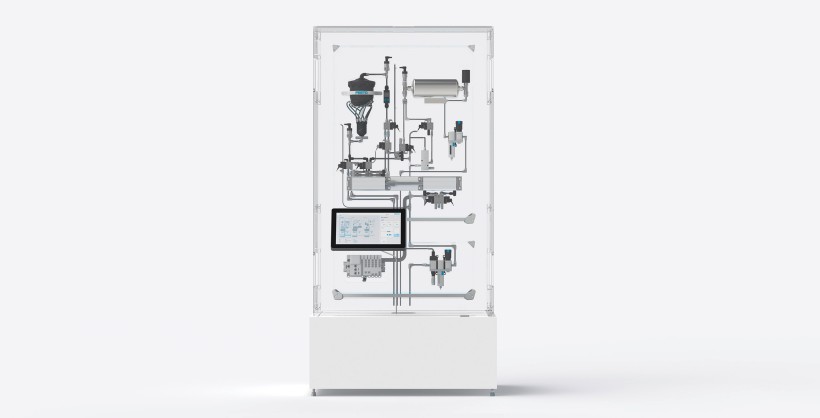
Algae grows best at a CO2concentration of about two per cent. However, since our ambient air contains far less than one per cent, the CO2collection module enriches the algae with a higher concentration. It filters the required gas from compressed air by blowing it into a chamber with CO2-binding granulate.
The granulate consists of a polymer that can absorb or release CO2depending on the prevailing conditions. If the granulate has absorbed enough CO2,it is heated to a temperature of 90 degrees Celsius to release the gas. The concentrated CO2is then finally cooled in an intermediate storage tank and blown into the bioreactor via an aeration element.
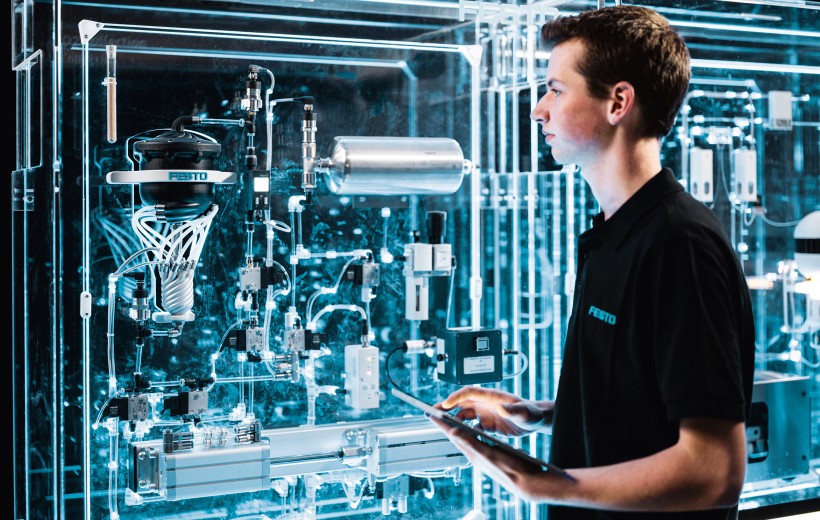
2. Analysis: monitoring the cells with the help of quantum sensors and AI
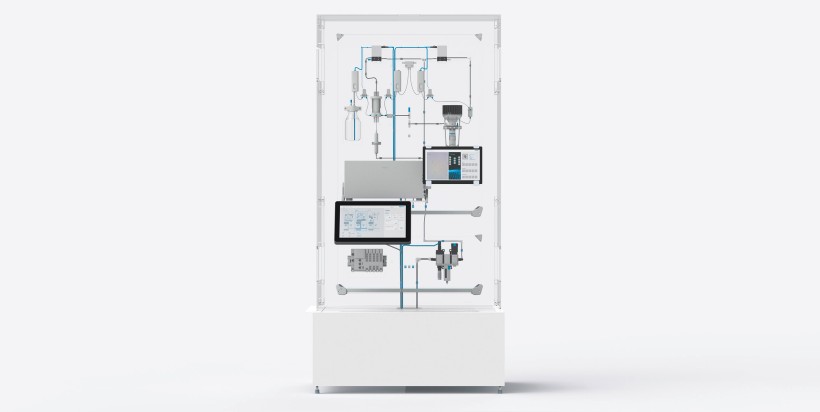
A major challenge with bioreactors is how to precisely determine the volume of biomass. To do this, we use an optical method based on microscopy and AI in the analysis module, as well as quantum technology. The digital microscope continuously delivers images that are evaluated by AI. It has been trained to recognise the algae cells using images.
A precision pump transports the algae cells out of the cultivation system for the quantum-based particle sensor. Using a precise valve system, they are fed to a mixing tank, where they are diluted with water for optimal analysis conditions. The so-called pressure-over-liquid principle enables a uniform flow rate and directs the mixture to the quantum sensor.
The sensor – developed by start-up Q.ANT – provides huge amounts of data, which can indicate the size and number of algae, but also foreign matter. With these analyses, it is possible to react to process events proactively and to intervene when regulation is required.
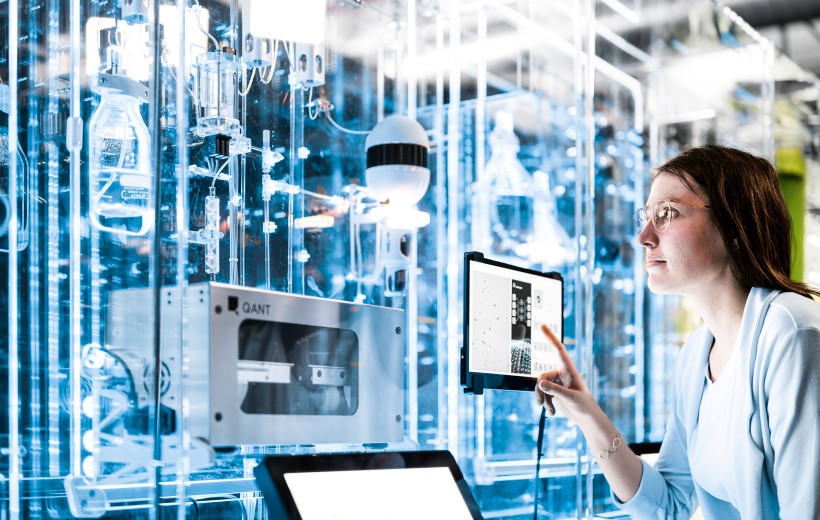
3. Cultivation: controlled growth of biomass thanks to automation
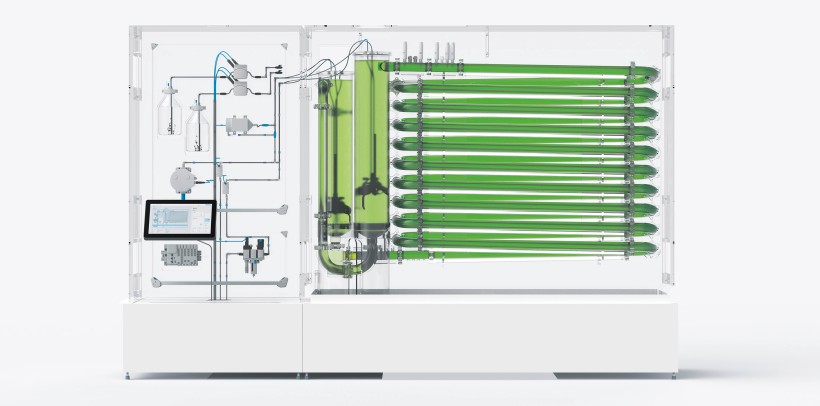
The core element of the BionicCellFactory is a 45-metre-long pipe system from Algoliner that has a capacity of 80 litres. The algae cells photosynthesise under optimal growth conditions in this transparent, illuminated photo section. Sensors continuously measure the conductivity, pH value, oxygen and CO2concentration as well as the temperature.
The system adds nutrients such as potassium, phosphorus and nitrogen depending on the needs of the algae. A heat exchanger ensures the temperature is right. The mass flow controller and innovative piezo valve technology enable the amount of air to be precisely dosed. An aeration element supplies up to 20 litres per minute. The resulting fine air bubbles ensure the optimal exchange of CO2and O2between algae and the environment.

4. Harvest: Harvesting the algae using a centrifuge
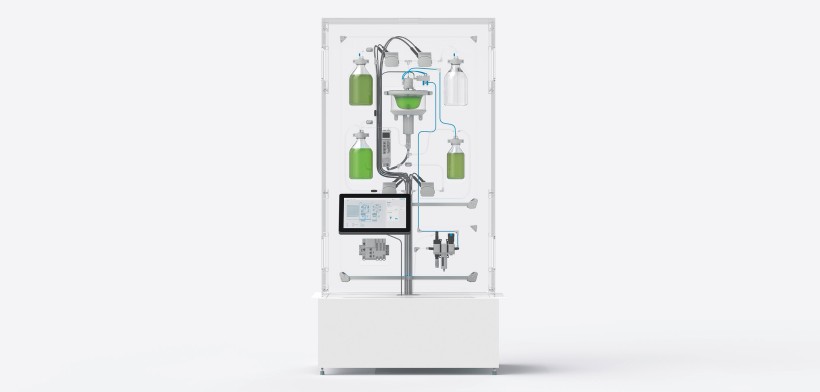
The harvest module is the interface between cultivation and enzymatic transformation of the biologically grown material. A centrifuge ensures the biomass is continuously harvested: the algae cells are separated from their aqueous environment at a speed of 10,000 revolutions per minute and pressed to the edge; the water is returned to the process.
The algae are then transferred to the next module using a pump, ready for additional processing. The timing and the amount of the harvest are regulated so that the vitality of the algae remains at the optimal level and the appropriate amount of biomass is available for transformation in the next step.
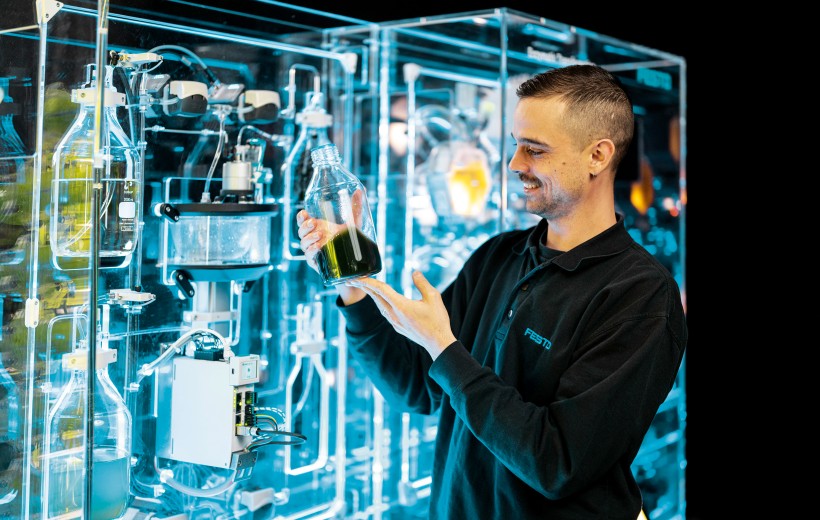
5. Enzymatic transformation: extraction and further processing of cell components

Five so-called transformation cubes with individual tasks create the optimal conditions for refining the algae by enzymes. They are biological catalysts that are fed in a specific way. This is how they support the gradual transformation, without the need for any heavy metals.
In order to extract individual components from the harvested algae, so-called enzyme scissors cut open the cell walls, and the ingredients, such as starch, proteins, dyes and the algae oil that we are looking for, can then be retrieved. This requires hardly any energy, because the environmentally friendly process runs at mild – automatically controlled – ambient conditions of 40 degrees Celsius and a pH value of five. The algae oil can now be used as a dietary supplement and for the production of cosmetics or processed into energy carriers or bioplastics. The algae remains can be used as feed or fertiliser.
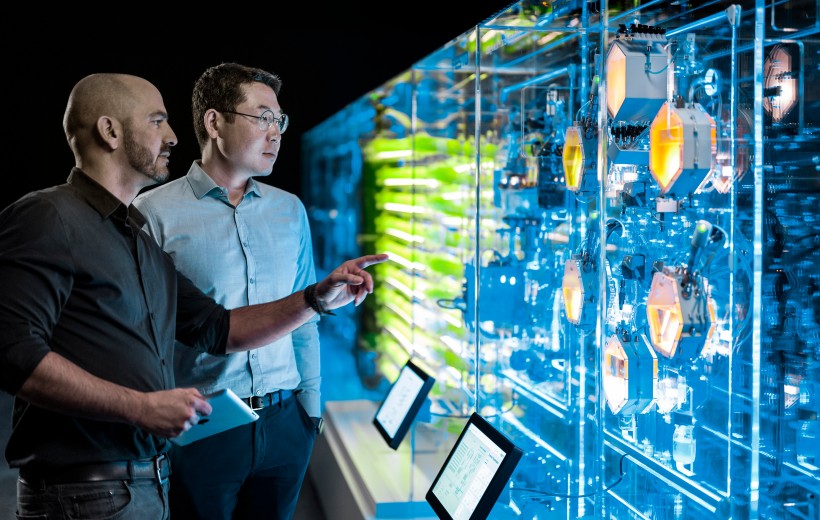
Control architecture
The modular design of the BionicCellFactory is also reflected in the control architecture: each module is regulated by a controller CPX-E from Festo. This means that the five process steps can be commissioned either together or separately and can easily be exchanged if there are any production modifications.
Experts can use the dashboards on the corresponding control panel to monitor and change individual parameters of the process steps. Data is exchanged between the modules via OPC UA and enables the entire BionicCellFactory to be regulated efficiently.
Production systems of the future
The BionicCellFactory as a model factory is the universal blueprint for complete production systems of the future. It can be scaled to any size with the help of our automation technology. To meet future demand for renewable raw materials, bioreactors with a capacity of several thousand litres are needed. Expertise in process automation is necessary to ensure that the systems can reliably produce the required amounts of biomass.
We develop intelligent control cabinet concepts for bioreactors with our customers and are continuing to expand our portfolio. The process systems enables us to ensure stable and precise process control with maximum productivity. This includes optimised aeration and feeding strategies, control algorithms, soft sensors for calculating the biomass in real time and system concepts for bio-based production processes.
New specialist fields for new technologies
Highly qualified technical staff and biotechnologists are not easy to find everywhere. Our experts at Festo Didactic are already analysing the need for new knowledge in order to define interdisciplinary networks and to establish innovative training professions, courses of study and additional qualifications in the fields of biomechatronics, biointelligence and sustainability.